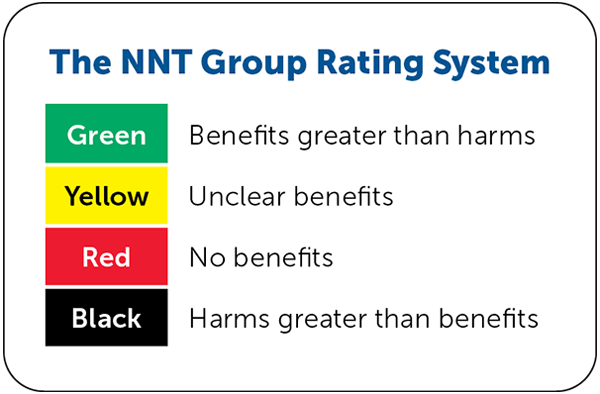
Am Fam Physician. 2016;94(5):online
Author disclosure: No relevant financial affiliations.


| Benefits | Harms |
|---|---|
| 1 in 72 had a nonfatal myocardial infarction prevented | 1 in 255 had a nonfatal stroke |
| 1 in 15 developed hypotension | |
| 1 in 18 developed bradycardia |
Details for This Review
Study Population: Patients undergoing elective surgery with varying degrees of cardiovascular risk
Efficacy End Points: Rate of nonfatal myocardial infarctions (MIs); rate of nonfatal strokes; cardiovascular mortality; all-cause mortality
Harm End Points: Hypotension; bradycardia
Narrative: Perioperative cardiac complications are a concern in patients undergoing surgery. Beta blockers were proposed as a means of reducing cardiac stress during the perioperative period. Early studies showed the use of beta blockers reduced nonfatal MIs in high-risk patients undergoing elective surgery.1,2 Based on this, the American Heart Association recommended the use of beta blockers with elective surgery for patients at high risk of cardiac complications in 2002.3 Despite rapid adoption of this recommendation by 2005, the practice was based on a few small studies of fewer than 1,100 high-risk cardiovascular patients. Later trials failed to demonstrate a meaningful benefit.4–6
In 2008, the Perioperative Ischemic Evaluation (POISE) trial examined more than 8,000 patients undergoing elective surgery, and compared metoprolol with placebo initiated two to four hours before surgery.7 Similar to previous trials, there was a small decrease in nonfatal MI with metoprolol (3.6% vs. 5.1%) but increases in nonfatal stroke (1.0% vs. 0.5%) and mortality (3.1% vs. 2.3%).
A 2014 Cochrane meta-analysis analyzed 89 randomized controlled trials with a total of 19,211 participants. The authors concluded that the use of perioperative beta blockade decreases the rates of ventricular arrhythmias and supraventricular arrhythmias in patients undergoing cardiac surgery. In the cohort of patients who underwent noncardiac surgeries, the use of perioperative beta blockers decreased the rate of non-fatal MIs (number needed to treat = 72) and increased the rate of hypotension (number needed to harm [NNH] = 15) and nonfatal stroke (NNH = 255).8
Caveats: In general, the studies of perioperative beta blockers are clinically heterogeneous, and examine different medications and patients with varying levels of cardiovascular risk who are undergoing various surgeries and treatment strategies. Most studies initiated beta blockers one day before surgery. A meta-analysis including only the trials at low risk of bias suggested a decrease in nonfatal MIs, with a corresponding increase in nonfatal strokes and all-cause mortality.
Two trials examined the use of beta blockers over a more prolonged course before surgery (DECREASE-I and DECREASE-IV).2,9 In these trials, the authors found a significant decrease in nonfatal MIs in patients randomized to receive perioperative beta blockers. The smaller of these two trials found a significant decrease in cardiac mortality (17% vs. 3.4%) in patients randomized to receive bisoprolol (Zebeta). These results failed to be replicated in the second trial that was larger and more methodologically rigorous. Given these disparate results, more data on the use of prolonged presurgical beta blockers are needed before definitive statements can be made about whether this strategy is of net benefit to patients.
This series is coordinated by Dean A. Seehusen, MD, MPH, AFP Contributing Editor, and Daniel Runde, MD, from the NNT Group (theNNT.com).
A collection of Medicine by the Numbers published in AFP is available at https://www.aafp.org/afp/mbtn.
This review is available from the NNT Group at http://www.thennt.com/nnt/perioperative-beta-blockers/.
